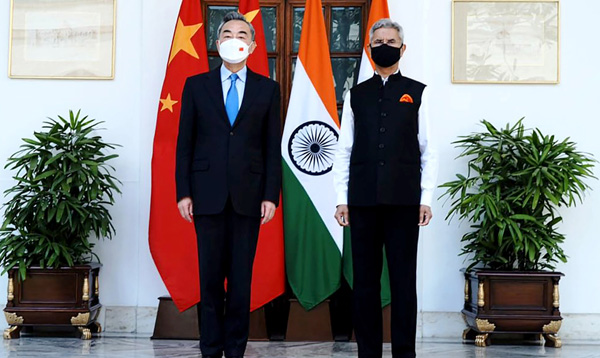
Jaishankar, Doval meet Wang
NEW DELHI, Mar 25:
India today clearly told China to complete the disengagement process in the remaining friction points in Eastern Ladakh quickly, asserting that bilateral ties cannot return to normal if the situation in the border areas is “abnormal”.
In his nearly three-hour “candid” talks with visiting Chinese Foreign Minister Wang Yi, External Affairs Minister S Jaishankar conveyed that restoration of normalcy in ties will require restoration of peace and tranquillity in the border areas.
“If we are both committed to improving our ties then this commitment must find full expression in the ongoing disengagement talks,” Jaishankar said at a media briefing shortly after the talks.
Describing the current situation as a “work in progress”, he also said that relations between India and China have been “disturbed” as a result of the Chinese actions in April 2020.
Wang flew into Delhi from Kabul on Thursday evening in an unannounced trip in the first highest-level visit to India by a Chinese leader after the border standoff in eastern Ladakh erupted nearly two years ago.
Referring to a series of military and diplomatic talks between the two sides, the external affairs minister said progress has been achieved on several friction points from the disengagement perspectives and this process needs to be taken forward.
“I would describe our current situation as a work in progress, obviously at a slower pace than desirable and my discussions with Foreign Minister Wang Yi today were aimed at expediting that process,” Jaishankar said.
To a question, Jaishankar referred to the presence of a large number of troops in the border region in contravention of laid down norms and agreements.
“If you ask me if our relationship is normal today, my answer to you is no, it is not. It cannnot be normal if the situation in border areas is abnormal,” Jaishankar said.
“Foreign Minister Wang spoke about China’s desire to return to normalcy (in the relationship) while also referring to the larger significance of our ties. I was equally forthcoming that India wants a stable and predictable relationship but restoration of normalcy will obviously require a restoration of peace and tranquillity,” he added.
Jaishankar said the military and diplomatic talks produced positive outcomes but noted that the situation in the region was not normal.
“We have a situation where peace and tranquillity in the border areas have been disturbed. So the situation there is not normal. (if) the situation there is not normal, if peace and tranquillity is the foundation of the basis of how we are going forward, then obviously that is also disturbed,” he said.
The External Affairs Minister described the talks as a “candid” exchange of views.
“We met for about three hours and addressed a broad and substantive agenda in an open and candid manner. We discussed our bilateral relations that have been disturbed as a result of the Chinese actions in April 2020,” Jaishankar said.
“The occasion provided an opportunity to exchange views on major international issues including Afghanistan and Ukraine. We also took up some other important concerns in our bilateral relationship including education travel and commerce.”
India and China have held 15 rounds of military talks to resolve the face-off in the remaining friction points in eastern Ladakh.
On March 11, India and China held the 15th round of high-level military dialogue to resolve the pending issues in the eastern Ladakh region. However, there was no forward movement in the talks which were aimed at resolving the remaining issues.
In September 2020, Jaishankar and Wang held extensive talks in Moscow on the sidelines of a conclave of the Shanghai Cooperation Organisation (SCO) during which they reached a five-point agreement to resolve the eastern Ladakh border row. The pact included quick disengagement of troops, avoiding action that could escalate tensions, adherence to all agreements and protocols on border management and steps to restore peace along the Line of Actual Control (LAC).
The two Foreign Ministers had held a bilateral meeting on the sidelines of another SCO meeting in Dushanbe in July last year with a focus on the border row. They again met in Dushanbe in September.
India has been consistently maintaining that peace and tranquillity along the LAC is key for the overall development of the bilateral ties.
Recently, Wang said some forces have always sought to stoke tensions between China and India, an apparent reference to the US.
The Ladakh border standoff between the Indian and Chinese militaries erupted on May 5, 2020, following a violent clash in the Pangong lake areas. The face-off escalated after the Galwan Valley clashes on June 15, 2020. As many as 20 Indian soldiers and an unspecified number of Chinese troops were killed in the clashes.
Both sides gradually enhanced their deployment by rushing in tens of thousands of soldiers as well as heavy weaponry. As a result of a series of military and diplomatic talks, the two sides completed the disengagement process last year in the north and south banks of the Pangong lake and in the Gogra area. Each side currently has around 50,000 to 60,000 troops along the Line of Actual Control (LAC) in the sensitive sector.
Meanwhile, NSA Ajit Doval today pressed Chinese Foreign Minister Wang Yi for early and complete disengagement of troops in remaining friction points in eastern Ladakh, official sources said. He also called for removing “impediments” to allow the bilateral ties to take their natural course, they said.
Wang, who holds the rank of State Councillor, arrived in Delhi on Thursday evening from Kabul on an unannounced visit.
The NSA and the visiting Chinese Foreign Minister held extensive talks on the border row.
Doval conveyed to Wang that the restoration of peace and tranquillity in the border region will help build mutual trust and create enabling environment for progress in relations, the sources said, adding that the discussions were held in a cordial atmosphere. (PTI)

